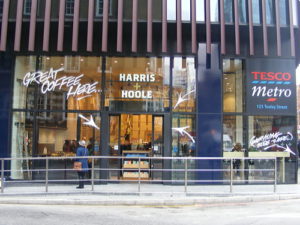Coffee Shops: Is Fair to Reduce the Use of Wifi?
People working on laptops, or sitting looking at their smartphones in a cafe is a common scene. A recurring conversation takes place in the coffee shop industry about whether coffee shops should provide wifi, power outlets, etc. with some arguing that if they do so it encourages customers to spend longer periods of time on the premises, but doesn’t necessarily encourage them to spend.
A discussion on CBC radio highlighted how some coffee shops in Canada are banning the use of laptops and smartphones on their premises, as part of a so-called ‘digital detox’.
One of the first questions in the discussion is why are coffee shops doing this?
Marketing professor Markus Giesler suggests that we need to understand two key trends in the coffee industry.
 First that coffee has become more of an art form, where artisanal competitions take place, and coffee has become almost a recreational thing for some people.
First that coffee has become more of an art form, where artisanal competitions take place, and coffee has become almost a recreational thing for some people.
Second, there is a competing trend in which coffee shops have increasingly become workplaces.
Young consumers, or millennials, have increasingly turned to the coffee shop as an office space. According to Giesler, it is these two competing trends that can be understood to shape the landscape that coffee shop owners have to navigate.
There has been a recent imperative to ban laptops, to try and shape consumer behaviour. For some coffee shops, people who often work on laptops spend too much time, but too little money, in their business, and they need to do something about it.
The question was posed, ‘What are the potential pros of banning tech?’, with Giesler suggesting that it could in theory lead to the return of the art of hospitality, focusing on conversation, and community. Although it was highlighted that a disadvantage with this kind of policy is that it may alienate the younger consumer crowd in particular. Increasingly, workers are not as tied to an office work setting, and need alternative places to work and hold meetings etc. Cafes that ban wifi will be much less attractive to this group.
The discussion then moved on to consider how likely it is that banning tech will change consumer behaviour and encourage social interaction. Giesler suggests that the idea that cafes are places for social interaction is a bit of a romantic understanding. Consumer research shows that millennials think that this is more their parents view of a coffee shops. Young consumers see it more like a workplace. This presents a challenge for the coffee shop owner to design a place in a manner that makes it attractive both culturally and commercially, potentially to both groups.
The discussion then moves on to include the owner of Taloola Cafe in Windsor, a place that made the conscious decision to not provide wifi. According to Linda Zagaglioni, the owner, coffee culture in coffee shops in the US are the piazzas of Europe, places for people to come and enjoy the atmosphere. She wants to offer food, drink, hospitality, and atmosphere in her cafe, and with the use of technology and people coming to do their work, some people extend their stay, which does not create the atmosphere intended. While customers have questioned why no wifi, there have also been occasions where people have said that the fact the cafe had no wifi forced them to sit and enjoy their breakfast.
Every year in the media there seems to be stories of cafes banning wifi or removing sockets, or creating laptop free zones (either spatially or temporally). For many coffee shop businesses to be sustainable they need a continuous turnover of customers, which can be prevented if a small number of individuals are using the space for a long time. This is particularly an issue where the coffee shop is small in the first place, or is located in an area with particularly high rental costs. Although, there are also coffee shops that have embraced the trend of working in their space, establishing dedicated co-working zones, or encouraging the use of the coffee shop as a meeting space, advertising their free wifi in a bid to attract consumers. This is likely to be an issue that continues to reappear in the media while coffee shops are ever present on our high streets.



